Dan Davis's Blog, page 20
May 27, 2015
The Discovery of Witches, by Matthew Hopkins
My next book features Matthew Hopkins, the self proclaimed Witchfinder General as the main baddie. While researching the last six months or so I’ve read an awful lot about this conman, serial killer and utter shitbag. I’d like to share some of his story because it is fascinating and totally horrific (and you like that sort of thing).
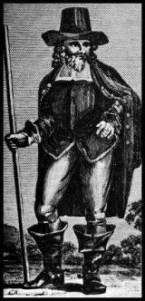
A stylish serial killer with a swagger. An evil man who escaped justice by dying.
For some context, he was “witch-finding” for only about three years between 1644-1647. He did it in East Anglia in England and he was only in his mid-twenties when he died (sadly, of natural causes… probably). Why is he so infamous? Well, in those three years he was responsible for the deaths of perhaps 300 women. We might expect there were loads of people executed for witchcraft back then but in fact there were perhaps 500 in total for all of England over 350 years and Hopkins did 300 of those in just three years and in one area.
Opposition to his activities was slow on the uptake, what with there being a civil war on and everything but eventually enough people questioned his methods that he knocked it all on the head, after making a good bit of cash from his activities. But to defend himself he published a book, or a long pamphlet, really, where he addresses these accusations one by one. I am reading it again now in order to pull out a few more turns of phrase to include in his dialogue. I am struck once again by just how much of an uptight, preening little prick he was. But also the level of creativity in his deranged fantasies is incredible; see the bizarre detail of the witches’ familiars… I’ll link to the full text of the book below but I just have to share some specific ones:
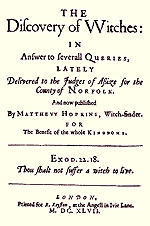
The title page to the Discovery of Witches where Hopkins’ justifies himself to straw man
His answer to “Query no.4” explains how he started out finding witches in the first place and is well worth sharing in full because it gets ever more astonishing:
The Discoverer [talking about himself in the third person] never travelled far for it, but in March 1644 he had some seven or eight of that horrible sect of Witches living in the Towne where he lived, a Towne in Essex called Maningtree, with divers other adjacent Witches of other towns, who every six weeks in the night (being alwayes on the Friday night) had their meeting close by his house and had their severall solemne sacrifices there offered to the Devill, one of which this discoverer heard speaking to her Imps one night, and bid them goe to another Witch, who was thereupon apprehended, and searched, by women who had for many yeares knowne the Devills marks, and found to have three teats about her, which honest women have not: so upon command from the Justicethey were to keep her from sleep two or three nights, expecting in that time to see her familiars, which the fourth night she called in by their severall names, and told them what shapes, a quarter of an houre before they came in, there being ten of us in the roome, the first she called was
1. Holt, who came in like a white kitling.
2. Jarmara, who came in like a fat Spaniel without any legs at all, she said she kept him fat, for she clapt her hand on her belly and said he suckt good blood from her body.
3. Vinegar Tom, who was like a long-legg’d Greyhound, with an head like an Oxe, with a long taile and broad eyes, who when this discoverer spoke to, and bade him goe to the place provided for him and his Angels, immediately transformed himselfe into the shape of a child of foure yeeres old without a head, and gave halfe a dozen turnes about the house, and vanished at the doore.
4. Sack and Sugar, like a black Rabbet.
5. Newes, like a Polcat. All these vanished away in a little time. Immediately after this Witch confessed severall other Witches, from whom she had her Imps, and named to divers women where their marks were, the number of their Marks, and Imps, and Imps names, as Elemanzer, Pyewacket, Peckin the Crown, Grizzel, Greedigut, &c. which no mortall could invent; and upon their searches the same Markes were found, the same number, and in the same place, and the like confessions from them of the same Imps, (though they knew not that we were told before) and so peached one another thereabouts that joyned together in the like damnable practise that in our Hundred in Essex, 29. were condemned at once, 4. brought 25. Miles to be hanged, where this Discoverer lives, for sending the Devill like a Beare to kill him in his garden, so by seeing diverse of the mens Papps, and trying wayes with hundreds of them, he gained this experience, and for ought he knowes any man else may find them as well as he and his company, if they had the same skill and experience.
Terrifying that he could come up with all that and also be sure to include this line;
Imps names, as Elemanzer, Pyewacket, Peckin the Crown, Grizzel, Greedigut, &c. which no mortall could invent
The balls on this guy.
Many of the queries relate to specific methods he employed to get confessions from these women. In continental Europe, witches were persecuted by the church for heresy and often burned at the stake. But in England they were tried as ordinary criminals who had committed malicious acts and hanged. Torture was illegal in England at this time but Hopkins devised ways around it by committing torture in all but name. In the Discovery of Witches, Hopkins addresses the obvious criticisms of each technique and justifies its use.
They’d look for the devils mark (third nipple, skin tag or other blemish) by stripping them and searching their skin, often using pins to prick their skin all over looking for rough patches. Stripping people against their will is a very effective form of psychological torture (see Abu Ghraib). And the “witch-pricking” was clearly a means of inflicting sustained pain (“I was only looking for a secret tit, M’lud!”). There’s probably no one alive today that doesn’t have some blemish they’d claim as a devil’s mark (they’d take a patch of dry skin if there was nothing else) and this was an era before we had Nivea.
Another favoured technique was “walking up and down” which was by propelling the victim at incredible speeds for prolonged periods (the torturers would take turns and rest). This was to bring about exhaustion. Hopkins whines that it was “only to keepe them waking”. Which exposes perhaps the cruellest and most successful technique; sleep deprivation. Every torturer knows that withholding food, water and sleep will break a person and Hopkins was well into all that.
And they’d also be subjected to trial by water, the famous ducking stools and other methods of submerging someone in a pond or river (Hopkins’ euphemism was “Swimming”. We know all too well about waterboarding and what the sensation of drowning can do to someone.
Even in the 17th century, people knew that doing this stuff was bullshit, as evidenced by Query 11:
Oh! [note this exclamation put sarcastically into his accuser’s mouth] but if this torturing Witch-catcher can by all or any of these meanes [the torture methods] wring out a word or two of confession from any of these stupified, ignorant, unitelligible, poore silly creatures, (though none heare it but himselfe) he will adde and put her in feare to confesse telling her, else she shall be hanged; but if she doe, he will set her at liberty, and so put a word into her mouth, and make such a silly creature confesse she knowes not what.
Answer
He is of a better conscience, and for your better understanding of him, he doth thus uncase himselfe to all, add declares what confessions (though made by a Witch against her selfe) he allowes not of, and doth altogether account of no validity, or worthy of credence to be given to it, and ever did so account it, and ever likewise shall.
1. He utterly denyes that confession of a Witch to be of any validity, when it is drawn from her by any torture or violence whatsoever; although after watching, walking, or swimming, diverse have suffered, yet peradventure Magistrates with much care and diligence did solely and fully examine them after sleepe, and consideration sufficient.
2. He utterly denyes that confession of a Witch, which is drawn from her by flattery, viz. if you will confess you shall go home, you shall not go to the Goale, nor be hanged, &c.
3. He utterly denyes that confession of a Witch, when she confesseth any improbability, impossibility, as flying in the ayre, riding on a broom, &c. [quite remarkable, I think, that in 1647 he’s scoffing at the idea of witches flying on broomsticks]
4. He utterly denyes a confession of a Witch, when it is interrogated to her, and words put into her mouth, to be of any force or effect: as to say to a silly (yet Witch wicked enough) you have foure Imps have you not? She answers affirmatively, Yes:did they not suck you? Yes, saith she: Are not their names so, and so? Yes, saith shee; Did not you send such an Impe to kill my child? Yes saith she, this being all her confession after this manner, it is by him accompted nothing, and he earnestly doth desire that all Magistrates and Jurors would a little more then ever they did examine witnesses about the interrogated confessions.
In other words, they only accepted confessions once the women were utterly broken and willing to say anything.
Finally, he touches on one of the reasons he had for doing this to innocent women (who were most often poor widows on the edge of village society who were victims of local feuds. Most accusers were other women from the same village). Money. Query 14:
All that the witch-finder doth is to fleece the country of their money, and therefore rides and goes to townes to have imployment, and promiseth them faire promises, and it may be doth nothing for it, and possesseth many men that they have so many wizzards and so many witches in their towne, and so hartens them on to entertaine him.
Ans.
You doe him a great deale of wrong in every of these particulars. For, first,
1. He never went to any towne or place, but they rode, writ, or sent often for him, and were (for ought he knew) glad of him.
2. He is a man that doth disclaime that ever he detected a witch, or said, Thou art a witch; only after her tryall by search, and their owne confessions, he as others may judge.
3. Lastly, judge how he fleeceth the Country, and inriches himselfe, by considering the vast summe he takes of every towne, he demands but 20.s. a town, & doth sometimes ride 20. miles for that, & hath no more for all his charges thither and back again (& it may be stayes a weeke there) and finde there 3. or 4. witches, or if it be but one, cheap enough, and this is the great summe he takes to maintaine his Companie with 3. horses.
Which means, yeah I charge a lot but people ask me to help and I have huge expenses, man! Those witches ain’t gonna prick themselves.
It’s interesting to note that the first witch trials in New England only began the year after Hopkins’ book was published, and his techniques used in those and subsequent witch hunts including Salem. And we know that his family had connections there; in Matthew’s father’s will there is provision for Matthew’s brother Thomas to “send him over the seaes to such our frinds in Newe England” (assumed to be in Salem). However it came about, we do know Hopkins spread his insanity to a whole other continent after his death, through this book.
If you are interested in the full text it is really short and there’s a link below. I’ll leave it there but sign off with perhaps the most chilling bit, from the title page, this stark justification:
EXOD. 22.18.
Thou shalt not suffer a witch to live.
Some online Hopkins resources:
The Wikipedia page is always a good place to start
Essex Witch Trials is a fantastic website. Ignore the dated design, the content is killer. If you are interested in the subject, I cannot recommend it enough.
Delve into an evil mind: The full text of the Discovery of Witches by Matthew Hopkins.





The post The Discovery of Witches, by Matthew Hopkins appeared first on .
May 26, 2015
Gunpowder & Alchemy Book 2 Update 4 – Main Editing Completed

The River Stour separating Essex and Suffolk is a beautiful landscape and the setting for some scenes of the book
“When you say you’re editing your book, what do you mean?”
I’ve been asked this a few times now. Let me tell you what I have been up to since I finished the first draft of the new book (“first draft” means I wrote the whole story but didn’t go back and rewrite any of it). So, in rough chronological order, it has meant the following:
I read what I had written. It’s funny, when you write something you don’t necessarily have a clue what it will read like. So I sat down and read the whole thing. Importantly, I did not make any changes at this time but made page and pages of notes about what to change when I started editing. This was a nice compromise between getting a reader experience and being productive.
A beta reader read the first draft (so really he was an alpha reader). A very generous fellow writer went through this draft and gave me great notes on initial thoughts and advice from a reader’s perspective. It’s somewhat unusual to do this at such an early stage but it really helped to inform the subsequent editing process.
I did my first big edit! This really took a lot of time. This meant making structural changes; combining and splitting chapters, deleting and adding scenes, deleting characters.
Addressing alpha reader feedback. This included there not being enough description of places or characters and also confusion about some key actions scenes. So more detail goes in, action clarified.
Including period detail. Linked to 4. but this is historical fantasy (now that my characters have discovered 17th century England) and I did a lot of research so this one meant going through and applying touches here and there especially of Colchester town and Colchester Castle.
Started cutting. After all this my word count had crept up to a maximum of 102,000 words. There is a lot of plot but that’s more words than are necessary to tell it so I began a brutal campaign of scorched words strategy. This was cutting scenes and ripping out unnecessary dialogue (I can’t believe how much my characters say things twice, he said, saying this twice and then saying it again just to reinforce the point in case you missed it). I’m down to 90,000 now and am still cutting. I know what has to go and then with the polishing I will probably end up around 80-85,000 which is kinda right for this genre.
Just a note here that I moved home during all of this and spent a month renovating the new house and this time plus the weeks either side were excruciatingly unproductive at times.
Anyway, it’s pretty much there now, I just need a few more days to streamline further, implement final beta feedback and then it will be on to the endless tedium of proofreading. So,what else is next?
Maps. I am creating the maps now (as well as one for Book 1). These will be a map of the Vale, a map of the Tendring Peninsular and I’d like to do one for 17th century Colchester.
Cover is being designed. Same designer as last time and it will be in the same style as WHITE WIND RISING and we planned the four-book series design at the outset but I can’t wait to see the new cover (the last one is so awesome, I love it).
Beta readers reading now. One is a sci-fi/fantasy aficionado, another an English Lit graduate. My alpha reader (an alt history author) is going over some revised chapters. A final reader is lined up for the final version (another writer with an eye for detail). I can’t emphasise how important this is and I am incredibly lucky to know so many generous people willing to spend their time doing this.
Publication! The end is in sight and I can’t wait to be able to share this next part of this story. Amazingly, after all this, I am still excited to read it myself and I hope others will be, too.
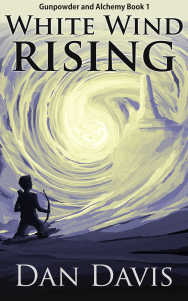
Gunpowder and Alchemy Book 1 available now on Kindle
WHITE WIND RISING (GUNPOWDER AND ALCHEMY BOOK 1) is available now on Kindle.
I got this new review the other day and I was really surprised by how good it was.
One of the best books I have ever read!! Love every detail. Characters have depth, strengths and seem so real.
It seemed too good to be true so I checked their review history and 1) they are a real person and 2) they have given other books lower scores and criticised them so I was, and remain, chuffed to bits.





The post Gunpowder & Alchemy Book 2 Update 4 – Main Editing Completed appeared first on .
March 27, 2015
Gunpowder & Alchemy Book 2 Update 3 – First Draft Finished

Writing and editing a novel requires some serious heavy lifting…
First draft is finished! Hurrah! But what does “finished” mean? For me it means I have all the chapters in and every chapter pretty much has a beginning, middle and an end. You can read the story as it is now and it is “a story”. There are 90,000 words of it. And so now the serious work begins. Editing…
I haven’t been blogging much because I have been writing. I’ve done those 90,000 words in three months or so and I’m not especially gifted at mental arithmetic but I think that’s an average of a thousand words a day. Not particularly brilliant but not too bad either, considering my only writing time is still from 10pm until I pass out slumped over my laptop, drooling. During these weeks we’ve also been in the process of buying and renovating a house which has wiped me out a bit but I force myself to write every night, no matter how tired I am. Getting between four and six hours sleep every night for three months takes a toll and with the limited time and mental / physical resources at my disposal I have prioritised getting to the end of the first draft above any other writing. It’s not been that hard, to be honest, because I’m itching to tell this story.
But I haven’t cheated (myself) in order to achieve get to this point. I haven’t skipped over the difficult sections (perhaps I should have done) and I have resisted going back and editing the earlier chapters. Before I started actually writing I set out a clear structure and outlined every chapter, more or less. The first third I had very clear in mind from before I started; most scenes, in fact. The middle section I could picture pretty well and the final third was a little vague. So, unsurprisingly, I deviated from my planned structure the further I got into it. However, I always had the ending to keep me focused. The route varied but the destination stayed the same.
There are 46 chapters, which is maybe ten more than I intended. I was aiming for about 2,000 words per chapter and in fact that is pretty much the average. The range is from about 1,000 words for those chapters where I have so far skimped on the descriptions or perhaps motivations or just detail generally, up to over 3,000 on some where I may have to be more focused and cut down or actually divide those into two. Obviously, chapters don’t all need to be the same size but consistency helps with the rhythm of reading and also helps me focus on getting to the point of each chapter. The structure of the chapters tends to be your classic “Someone wants something > they try to get the something > they get or don’t get the something”.
Editing. I have so many notes that I have made along the way on things I need to add in or change. So what I will do first is check through all the big structural stuff. What can I cut out? Is this vital to the story (including the overall story – this is a series after all)? If not, sorry, lovely description, you’re cut. Aww, you’re a really funny joke but you don’t fit the tone? You’re cut. You’re a historical character making a cameo but you’re slowing down the narrative? Ah man… yeah, you’re cut, too. Don’t look at me like that, hit the showers. Then there’s a load of info-dumping at the end which I need to spread throughout instead and I need consistency in characterisation / arcs and so on.
After all that “writing craft” nonsense, I have tons of research I am dying to include. Tons of period detail and language. I have character names to choose, place names to decide on. Ah, man, it’s going to be great.
I intend to post more often here again now that I’m at this point. Having said that I’m actually, finally moving house next week so I might have to have a couple of nights off from writing altogether… Imagine that! I’m not sure I can.

Gunpowder and Alchemy Book 1 available now on Kindle
WHITE WIND RISING (GUNPOWDER AND ALCHEMY BOOK 1) is available now on Kindle.
It’s one of those that has you going ‘OK, I can’t put this down right now, I need to know what happens next’… all the way through.





The post Gunpowder & Alchemy Book 2 Update 3 – First Draft Finished appeared first on .
February 18, 2015
Gunpowder and Alchemy Book 2 Update 2 – On Writing and Research
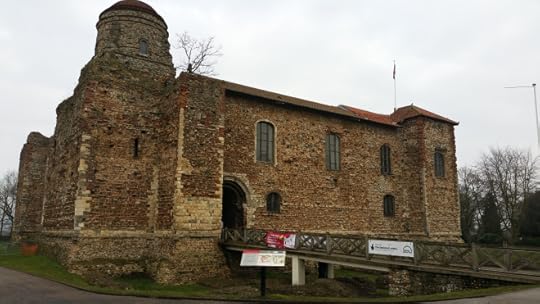
Colchester Castle features in my story as the scene of a prison break. The castle served as Colchester’s gaol for hundreds of years. Now houses an excellent museum.
Hard to believe my last update was just before the New Year when I had barely begun but I have been writing and researching furiously since. Not as furiously as Book 1, of course, or I’d be done by now.
In the last six weeks I have written 55,000 words of this story. Just starting chapter 33 now, the final third of the book and will be wrapping up the first draft very soon. I’ve always seen editing as a bit of a chore, compared to the joy of bashing out that first draft but I have to say I can’t wait to get into editing this one. There’s so much I have discovered through the writing of it and I am dying to get it all into the story.
Story-wise, I did have my structure all planned out from the start. But getting the detail resolved has slowed me down because the story gets a bit complicated. So, having a few chapters summarised as little more than “then they break Keeper out of prison” is all very well but the logistics of getting who where and how took some working out. And that’s also, to a certain extent, where I am poised again. I know the ending. I know where my characters are right now. I need to find the best solution for getting them where they gotta be.
Issues I’m addressing right now include;
There is going to be a climactic battle but it cannot be too bloody because, you know, this is a kid’s book! I must make it exciting, explosive and perilous without blowing anyone’s head off… which is really tough because that’s what battles are like. I’m tempted to have the bad guys surrender following some clever-clever gambit but that would be lame. I’ll work something out.
Having spent the two thirds of the story gradually reuniting my characters I am now about to split them up again. Multiple parallel narratives is a joy for me to read but it’s a pain to write (and yet I keep doing it). I’m going to have to draw loads of flipping timelines again, aren’t I…
Have I gathered too many supporting characters into the narrative and should I get rid of someone before continuing? I know I can fix it in editing but I’d rather fix it first as that is far more efficient, for me.
One of the other reasons I’m writing a bit slower is the amount of research I’ve done and am continuing to do. I thought I already knew quite a lot about 17th century England but it turns out I didn’t. Well, I thought what I didn’t know were all known unknowns but actually the unknown unknowns were vasty and deep. So I’ve been reading books, Wikipedia and history websites and there are some good lectures and even a couple of decent documentaries on YouTube. Subjects researched have included:
The English Civil Wars, Oliver Cromwell and the New Model Army
Witch trials and Matthew Hopkins the “Witchfinder General”
The Levellers, the Diggers and their leaders especially Gerrard Winstanley
William Gilbert, astronomer and electricity pioneer
William Lilly, astrologer and bullshit artist
the history of Colchester (the location features largely)
the very early Christian Church and the Church in the Roman Empire
steam engines
sailing and ships
Alchemy and alchemists… again
I hope to share some of this learning here when I can make some time for it. I know plenty of people find this stuff as interesting as I do.
My series is an alternative, fantasy history and I have been asked why I am bothering to get the detail on the army uniforms historically accurate when I have the soldiers of the New Model Army churning up the countryside in a steam-powered landship. That’s a fair point and no I am not keeping to history as it happened but I want the differences to be conscious ones and I feel like I owe it to the history to get it right. Ultimately, I guess, it just pleases me to do so.
Finally I just want to mention that last weekend I went on a self-directed tour of Colchester, particularly Colchester Castle and the Castle Park, and the remains of the Roman Wall surrounding the old town and the many remaining old buildings in the Dutch Quarter. It was incredibly useful for my story but it’s also somewhere with a long and interesting history. I do recommend a visit to the Colchester Castle Museum. It is not huge but it is very modern (following an extensive renovation a couple of years ago) and well curated. And you can try on replica helmets and stuff and they even have a replica of a section of about an eighth of an Iron Age roundhouse complete with a re-enactor or two who will be busy with period crafting and answering questions from curious children.
I feel the end in sight now and am looking at an April release. Although I have to move house between now and then I do think it is perfectly possible, so long as I stop faffing about and just get on with it. It’s 11.30pm now so I have about two hours of writing time before bed…

Me and a 17th century helmet. If I look slightly embarrassed it’s because I was alone and people were staring at me. Presumably being alone is unacceptable.

William Gilbert (or Gilberd) and his book with the killer title: On the Magnet and Magnetic Bodies, and on the Great Magnet the Earth

St Mary’s at the Wall, Colchester. The bottom of the tower is late 15th century. The top is early 18th century. The transept is late 19th century. (Three boom times)

Gunpowder and Alchemy Book 1 available now on Kindle
WHITE WIND RISING (GUNPOWDER AND ALCHEMY BOOK 1) is available now on Kindle.
One of the 5-star review says:
Thoroughly enjoyed this book. I love the characters and the way the story has unfolded so far. The scenes are well described and I can’t wait for book 2.
Not long now!





The post Gunpowder and Alchemy Book 2 Update 2 – On Writing and Research appeared first on .
January 11, 2015
Inspiration for Writers – What You Can Learn from Stargate SG1 and Stargate Atlantis
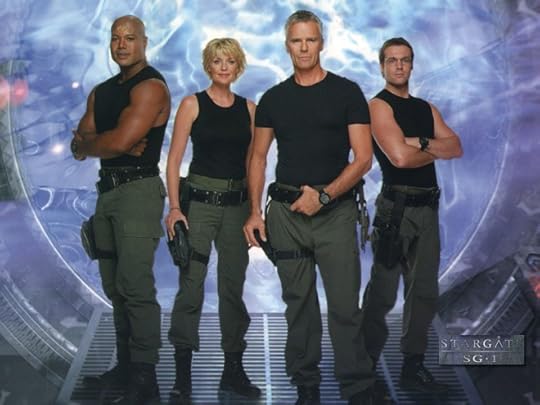
The SG1 Classic Era Lineup, guns out
Stargate SG1, the long-running but kind-of underrated sci-fi TV show ran from 1997 – 2008 but I only just watched it over the last few months. I saw a few of the first season back when it was first broadcast and then caught a few here and there but I never knew what in the heck was going on so never paid attention. I was looking for something to watch on Netflix back in October 2014 and was shocked to see there were ten seasons of it. Ten seasons is loads, almost nothing gets ten seasons and even stuff with good numbers get cancelled way before that (see Joss Whedon’s TV career after Buffy for example). So I thought I’d chuck it on, see what it was like. Then I watched all ten seasons non-stop. That’s 218 episodes in about three months. I just finished the last episode a few days ago. It’s far from perfect and is very uneven but let me share a little of what I learned.
I should tell you that I have shows and videos playing when I do pretty much anything. When I am cooking, doing housework, working my day job (when I work from home) and also when I am writing. I watch or listen to things on YouTube – right now Dan Carlin’s Hardcore History or the endless array of lectures from universities like Stanford (e.g. Robert Sapolsky’s famous Human Behavioural Biology course)
And I realised toward the end of writing my book in November just how many similarities have crept in. Remember that I wrote the majority of this book while Stargate was playing next to me on my phone and in my headphones. I wasn’t always paying the strictest attention and managed to miss some major plot developments while I was focused on writing. So are these similarities coincidental or was this unconscious inspiration at work?
A team of four characters
Stargate SG1 (for most of the ten seasons) and equally-good spin off Stargate Atlantis had four main characters who work in the same team and feature in pretty much every episode. My book has four, too. That may not seem so surprising but if you take a moment to think about it, not many shows or books have so many.
One protagonist is clearly standard; it’s the hero’s journey so take your pick of, say, action movies for examples.
Often you get two; cop shows and books often (usually?) feature ‘partners’ working together to solve crimes and maybe explore sexual tension. Obviously romance novels tend to feature two individuals coming together. My favourite historical fiction series, Patrick O’Brian’s Aubrey-Maturin books use this dynamic perfectly. My other favourite histfic, Bernard Cornwell’s Sharpe books may seem to be a single protagonist but I’d argue it’s really about Sharpe and his loyal Sgt Patrick Harper together forming a single literary unit…
Three characters work well, too, especially when they work together as a group. We all know about the Rule of Three. For examples, Harry Potter springs immediately to mind. You also see it in sitcoms or comedy shows like Black Books, the IT Crowd or Father Ted… all written by Graham Linehan, admittedly but he obviously knows a thing or two about writing successful comedy. (Does Seinfeld have three or four, would you say?)
Which brings us to four.
Why have four? Well, four works well because you can have so many unique relationships. Character A can have a one-on-one relationship with B, C and D. But they can also form a trio with B and C or C and D or B and D. Do the same for each character and you have a huge number of interactions (who here is good at maths? Is it 15?). You can have the group as a whole form a united front, especially against external threats, and you can also have plenty of squabbling, infighting and schisms.
However, one of the key strengths of the Stargate franchise is the camaraderie, the friendship, the bonds forged through shared experience and danger and it is this most of all, I would argue, that won it so many loyal fans. More than one character tells the others they are like a family. Quite a few times I got a bit dewy-eyed watching characters giving their death speech or two characters getting over their differences to admit how much they really care about each other. The final episode of SG1 (Season 10 episode 20) did this really well (despite a bizarre, out of character rant by Jackson). My four characters also argue and fight amongst themselves but it’s all to emphasise and balance their ultimate love for each other. Just like in a family.
But writing four main characters has its drawbacks. It can be difficult at times to involve everyone in the plot with a genuine purpose and often you will see certain group members taking a back seat while the others are getting on with it. Writers often have random characters throw in a comment or two almost at random to show they’re still listening. This can be a good opportunity to inject some comedy but you’ll also notice how often the line could have been said by anybody (which can be a sign it was originally said by another character until the line was given to another to bring them into the action).
Nevertheless, writing a group of four is easy-peasy lemon-squeezy… when they are all together. If you have your guys split up, geographically, then plotting can become difficult. If they’re split into two groups then it’s not so bad. But if you have up to four different plot lines operating separately that need to come together then it can get very tricky indeed. Plus, if they’re separate for too long then you’re missing out on the group dynamics which is the main reason for having them all anyway… so get them back together asap, through adversity, of course. They’re stronger together, in every way.
Special / super powers and balanced character traits
Each of the characters has to have something special about them. Stargate has O’Neill with his special forces skills and leadership / decision making abilities. Carter is the token female and a genius astrophysicist, engineer and is also a badass with hand to hand combat and assault weapons. Jackson is a linguist, ancient historian and know-it-all and his special powers include being the team’s personified conscience and whiner. Teal’c is the token minority and is essentially a super soldier, with super offensive skills and has super regeneration powers (and tragically under-utilised super leadership).
My four characters all have abilities to control the elements. Wind, water, earth and fire. But each are not equal in their abilities, not by a long shot. And they have their own unique skills and character traits that provide balance as well as enormous story-telling potential. I also made sure we have two boys and two girls, rather than the single, lonely female you often get with groups of four characters in TV shows generally and Stargate specifically.
Essentially, everyone in the team / group is special in their own way and their powers and traits are balanced so each character can have a unique approach to solving a problem. It is not necessary for them to be equally strong but if you have any that are wildly more powerful than the others, or any that are underpowered then it can be an issue for your story telling. In SG1 and Atlantis they play with this trope all the time, giving one of the characters increased powers through plot devices such as retro-viruses, drugs, nanites, ancient knowledge-transfer devices (aka “magic”) and then they explore the idea that power always comes with some kind of cost and usually the character reverts to their usual level by the end of the episode. And that’s a good point to remember; with great power comes great… exhaustion, or psychopathy or risk of death or some other terrible reason to turn away from the proffered power. You can’t have any one character out of balance with the others for too long or else they’re not really a group of four any more.
An underdeveloped culture coming into contact with one far more advanced
In Stargate they’re every week coming into contact with a civilisation on another planet that is less technologically and/or culturally advanced than ours. It’s often a medieval, renaissance, early-modern or 19th century civilisation gasping in awe at the power of P90 assault weapons or lusting after C4 explosives or furrowing their brows at concepts such as equality or freedom of expression. And sometimes our heroes will meet civilisations far advanced of ours, with technology that is indistinguishable from magic. This element is one of the great strengths of the show and gave them such great opportunity to explore aspects of our real-life cultures as well as our own shared history.
And I didn’t realise until after I’d written it but I did the same kind of thing with my story. I have my four characters and the Vale they live in being held in a kind of Anglo-Saxon bubble of time while the England around them moves on for a thousand years. My characters (in book 2, writing now) then experience the enormous culture shock of emerging into the 17th century English Civil War. That interaction between disparate cultures is giving me such a rich seam to mine. It’s also really fun to see people confused and exasperated by cultural misunderstandings and also adds an element of danger. Like when you go on holiday and you don’t know the proper etiquette for buying a pastry or how to pay the bill… only more deadly. Okay it’s more like when you go on holiday and you don’t know the proper etiquette for buying drugs and guns. You know what that’s like.
Comedy!
I love that Stargates SG1 and Atlantis don’t take themselves too seriously. Or rather, that they strike a balance between comedy and drama. They deal with parasitic alien brain-worms and life-sucking alien monsters and shape shifting robots and the constant threat of death and the destruction of earth. This could be overwhelmingly dark (like the vastly superior but miserable Battlestar Galactica) or so done so toothlessly that you feel absolutely no sense of peril (Star Tek: TNG).
Apparently, Richard Dean Anderson took the role of O’Neill on the condition he could make it fun, and funny. They rolled that attitude out across the franchise and continued it even after he left. The characters joke with each other. The writing nods and winks at you, the viewer, and throws in references to pop culture, other movies and shows, sci-fi tropes and meta-jokes.
I’m writing a children’s series. It can’t be too dark, not because kids can’t handle it – they can and they love it – but because it should be fun, too. That’s why, for all the scary stuff in there (mainly about coming into contact with the oblivious and uncaring adult world) I am also cramming in as much comedy as I can. It can’t all be dark or it just gets tedious (anyone read the fantasy series Chronicles of Thomas Covenant? I have, twice. Glum don’t cover it.)
So, anyway, I put a fart joke in book 2 the other day.
In summary; Stargate SG1 and Stargate Atlantis. At times brilliant, laugh out loud funny, even quite brilliant. But also at times dumb, rushed, repetitive, under-budgeted, and often derivative. So not the best TV shows ever. Not even the best sci-fi TV shows ever but they are hugely fun, they are an easy watch and they do demonstrate a huge amount of tropes, plotting and writing tricks that us writers could learn from. At least, I’m sure that I have.
You do have over 300 hours to spare, right?
Gunpowder and Alchemy Book 1 available now on Kindle
WHITE WIND RISING (GUNPOWDER AND ALCHEMY BOOK 1) available now on Kindle.
Excerpt from a lovely 5* review: “Free from the twee mis-imaginings of childhood that mar so many children’s books written by adults, it’s a story filled with feelings of genuine peril and menace, in which the story’s central characters are sometimes naive, but sometimes inspired, and somehow inspiring.”
The post Inspiration for Writers – What You Can Learn from Stargate SG1 and Stargate Atlantis appeared first on .
December 29, 2014
Gunpowder and Alchemy Book 2 Update
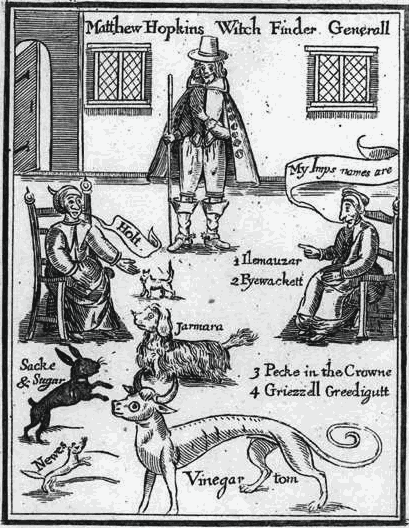
Matthew Hopkins; evil conman and serial killer. The perfect historical character to include in a children’s story!
I have been quiet on the blogging front and that’s mainly because I am busy writing the second book in the Gunpowder and Alchemy series. So, where am I at?
Planning; overall arc was decided a while back but now I have every chapter roughed out. We are looking at 38 chapters at the moment but no doubt that will change as we go.
Actual writing; first five chapters are written now (will be six by tomorrow and, say, twelve by next Monday…). It’s so much fun getting it all out, finally.
Characters; we have a new perspective for this book in the shape of Writer. Book 1 was told entirely from Archer’s point of view but book 2 alternates chapters between him and Writer. It’s exciting getting to look out at this world with a fresh pair of eyes. As well as the old characters we get to see Archer’s family, the alchemist Cedd is introduced and, most excitingly Matthew Hopkins the Witchfinder General and his gang of thugs and assistants. I am also looking forward to writing Oliver Cromwell at the end of the book, too. The last few weeks I have been researching these historical figures and have discovered some fascinating things I shall share with you all soon (for example, I discovered that Hopkins was pals with Cromwell’s chief of secret service… that fact has some interesting implications.)
Setting; as well as the Dedham Vale we are moving out to expand the scope which is great as I get to explore more of my alternative 17th century England with the characters. We are visiting a version of Colchester and getting there by boat around the coast of the Tendring Hundred. Can’t wait to show some of the rough and ready steam-powered technology of this world.
Okay, that’s enough for now, I am getting back to it!

Gunpowder and Alchemy Book 1 available now on Kindle
WHITE WIND RISING (GUNPOWDER AND ALCHEMY BOOK 1) is available now on Kindle.
I just yesterday got a very lovely 5-star review that says:
Thoroughly enjoyed this book. I love the characters and the way the story has unfolded so far. The scenes are well described and I can’t wait for book 2.





The post Gunpowder and Alchemy Book 2 Update appeared first on .



